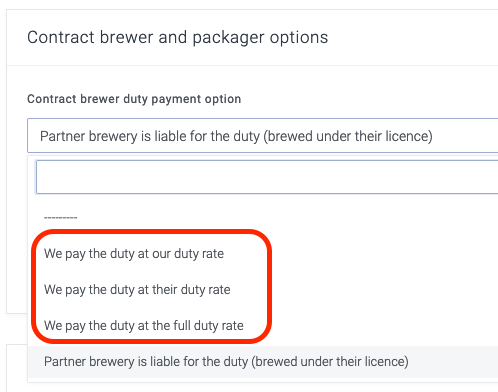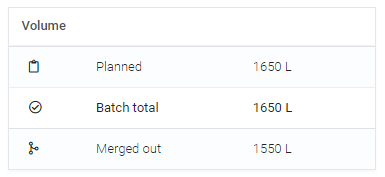The “Annual production this year to date” from the duty page is the total volume that you have racked/packaged from batches for which you are liable for the duty. You’re liable for the duty on:
- All in-house brewed batches that are brewed for yourself.
- All in-house brewed batches that are contract-brewed for someone else under your license.
- Any batches that have been contract-brewed for you where you’ve chosen that you pay the duty (all the “We pay…” options in the screenshot below).

This setting can be found on the contract brewer entity itself and each time you start a contract-brewed batch, the option chosen for the contract brewer at the time is taken and stored against that batch, so that you can change this option in the future without affecting previous batches.
Does this include beer used for samples (both internally & free samples to customers)?
Yes. Breww calculates the annual production figure in accordance with the UK’s Excise Duty Notice 226, which states that the annual production figure includes “any beer used for sampling or research”.
What about beer racked and then spoiled before it has ever been sold?
It’s important to distinguish between the volume produced and the volume that you have to pay duty on. These are two different things. UK beer duty becomes liable at the point the beer leaves duty suspense (typically the delivery van leaving the brewery). This entire help guide is about the volume produced, so it’s important not to confuse production with sales or deliveries.
For example, if you produced a large batch of beer, racked it and then realised it was all oxidised and had to waste it all, this should technically be included in your volume produced, but it wouldn’t have had any duty actually payable on it and wouldn’t show in any sales/delivered figures. Breww will include this volume in your production figures.
What about merged batches?
If a batch is merged into another (giving you a “Merged out” volume as in the below screenshot), this volume is moved into another batch and has no direct impact on your production volume for duty purposes. This volume will, however, have increased the volume on another batch (the one that received it), which can then be racked/packaged from and so may subsequently contribute to the total production volume for duty purposes.
